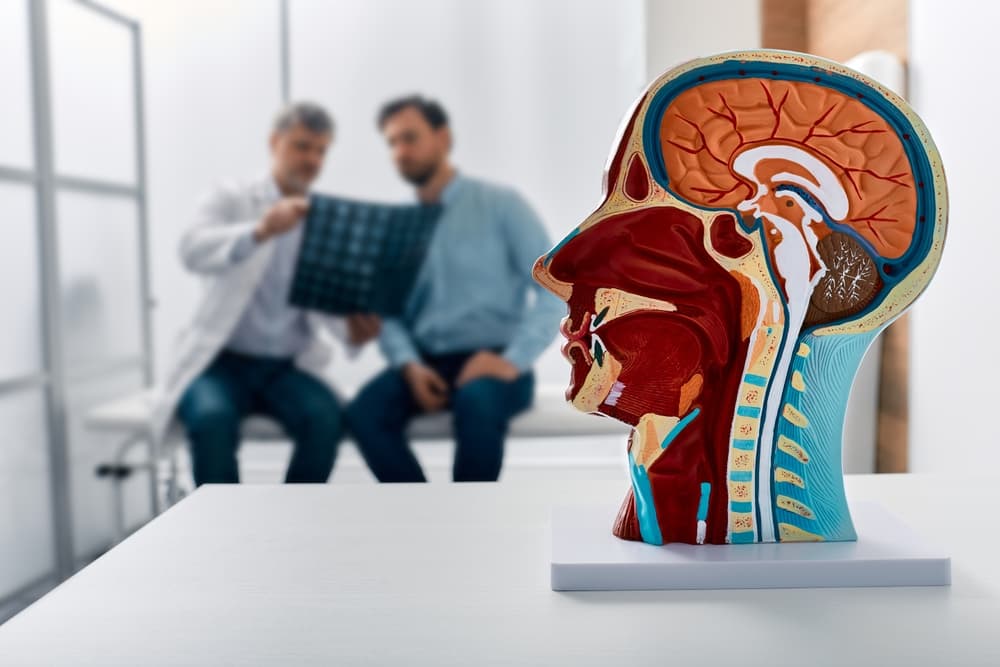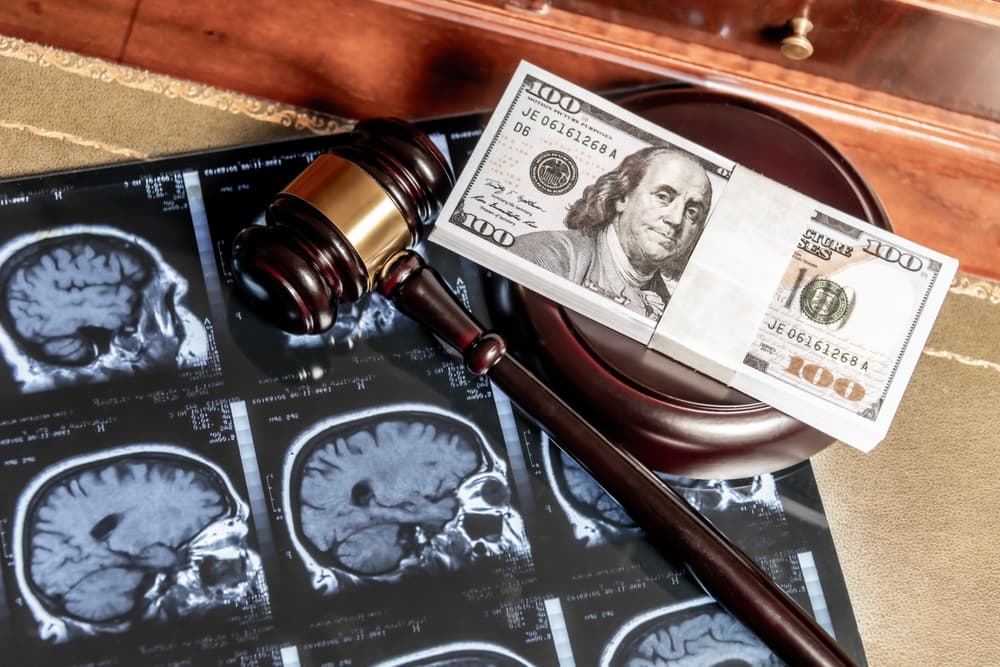The timeline for a brain injury claim depends on many factors, including the type of brain injury you’ve sustained, the circumstances of your accident, and how willing the insurance company is to negotiate fairly. Brain injury claims can take months or even years to resolve, but no matter how long it takes, The Perecman Firm is committed to fighting for the maximum compensation you and your family deserve.
If you’ve suffered a brain injury in an accident, you may feel overwhelmed by the uncertainty of what comes next. Our personal injury attorneys understand how a brain injury can impact your health, your ability to work, and your family’s future.
Our experienced attorneys will walk you through what you need to know about brain injury claims, including the factors that may affect your claim's timeline, the compensation you may be entitled to, and why consulting a lawyer early is essential.
What Is a Brain Injury?

A brain injury occurs when the brain is damaged by trauma, lack of oxygen, or other external forces. Brain injuries can vary widely in severity, from concussions to life-altering traumatic brain injuries (TBIs). Every head injury should be considered serious.
Common types of brain injuries include:
- Concussions: Often caused by a blow to the head, concussions can result in temporary symptoms like headaches, confusion, or dizziness. While some people recover fully, repeated or severe concussions can lead to lasting damage.
- Contusions: These are bruises on the brain caused by direct trauma, which may require surgical intervention in severe cases.
- Diffuse Axonal Injuries: These occur when the brain’s nerve fibers are torn due to rapid movement, such as during a car crash or a fall. This type of injury is often severe and can result in a coma or long-term disability.
- Penetrating Brain Injuries: These occur when an object pierces the skull and damages brain tissue, often resulting in catastrophic consequences.
- Anoxic Brain Injuries: Caused by a lack of oxygen to the brain, these injuries can result from medical malpractice, drowning, or suffocation.
Every brain injury is unique, and its impact on your life will depend on the severity of the injury, the treatment you receive, and the resources available to aid your recovery.
How Brain Injuries Happen in Personal Injury Cases
Brain injuries can occur in various scenarios that may lead to a personal injury claim, including:
- Construction Accidents: Falls from scaffolding, being struck by falling objects, or crane accidents can result in severe brain injuries.
- Motor Vehicle Accidents: The force of impact in crashes involving cars, trucks, or motorcycles frequently causes brain injuries.
- Workplace Accidents: Beyond construction, unsafe work environments can lead to slips, trips, and falls or exposure to dangerous conditions, causing brain trauma.
- Premises Liability Incidents: Brain injuries in poorly maintained buildings may result from slip-and-fall accidents or falling debris.
- Medical Malpractice: Surgical errors, improper anesthesia administration, or birth injuries can lead to anoxic brain injuries.
- Acts of Negligence or Violence: Assault or other negligent acts can cause penetrating or traumatic brain injuries.
If you or a loved one suffered a brain injury in any of these situations, a construction accident lawyer or personal injury attorney could help you pursue a claim against the party responsible.
Why Does the Type of Brain Injury Affect the Timeline?
The severity and type of brain injury directly influence how long it takes to resolve a claim. For example:
- Mild Injuries: While all head and brain injuries are serious, claims for what are considered “minor” injuries may resolve more quickly, especially if the insurance company does not dispute the diagnosis or damages.
- Severe or Catastrophic Injuries: Cases involving severe TBIs often take longer due to the need for extensive medical evaluations, long-term care cost projections, and greater compensation demands.
- Disputed Injuries: If the defendant’s insurance company challenges the severity of your injury or claims pre-existing conditions are to blame, the process may require additional medical testimony and documentation.
Because brain injuries often have delayed or evolving symptoms, it’s essential to wait until the full extent of the injury is clear before settling. A lawyer can ensure that you don’t settle for less than your case is worth.
What Compensation Is Available in a Brain Injury Claim?
A brain injury claim can cover both economic and non-economic damages, including:
- Medical Expenses: Costs for emergency treatment, hospitalization, surgery, physical therapy, and ongoing care.
- Lost Wages: Compensation for income lost while recovering and reduced earning capacity if you cannot return to work.
- Pain and Suffering: Damages for physical pain, emotional distress, and the loss of enjoyment of life.
- Future Care: Long-term care, home modifications, or assistive devices required due to the injury.
- Loss of Consortium: Compensation for the impact on your relationship with your spouse or family.
Brain injury claims often involve substantial compensation due to the long-term impact on a person’s life and livelihood.
What Is Involved in Building a Brain Injury Case?
Building a strong case requires careful preparation and evidence collection, which may affect the timeline of your claim. Steps include:
- Investigating the Accident: Your lawyer will gather evidence, interview witnesses, and document the circumstances of your injury.
- Securing Medical Documentation: Comprehensive records from your healthcare providers will be crucial to proving the extent of your injury and its impact on your life.
- Consulting Experts: Medical and financial experts may provide testimony to support your claim, particularly if long-term care or future lost earnings are involved.
- Negotiating With Insurance Companies: Insurers often delay or undervalue claims, requiring your lawyer to push for a fair settlement.
- Filing a Lawsuit if Necessary: If a settlement cannot be reached, your lawyer may file a lawsuit and prepare for trial.
Each of these steps takes time, but they are necessary to ensure you receive the compensation you deserve.
Unique Challenges of Brain Injury Claims

Brain injury claims come with a unique set of challenges that can make them more complex than other types of personal injury cases. One major difficulty lies in proving the full extent of a brain injury. Unlike visible injuries such as broken bones or lacerations, brain injuries often involve symptoms that are internal and not immediately apparent.
For example, a person may initially appear unharmed after an accident but later develop cognitive issues, memory loss, emotional instability, or chronic headaches. These delayed symptoms can complicate the process of linking the injury to the accident and establishing the severity of its impact. Medical imaging and expert testimony are often necessary to demonstrate the connection and provide evidence of the injury’s scope.
Additionally, brain injuries are often evolving in nature. The long-term effects of a brain injury, such as permanent disability or the need for lifelong care, may not be evident for months or even years after the accident.
This requires careful consideration when negotiating a settlement, as accepting compensation too early could leave the injured party without sufficient resources for future medical needs or lost income. A skilled lawyer will ensure that settlements or verdicts account for the full range of current and future damages.
Finally, the complexity of brain function itself adds another layer of difficulty. Every brain injury is unique, and even two individuals with similar injuries may experience vastly different outcomes.
This unpredictability makes it essential to work with experienced legal professionals who understand the medical and legal intricacies of brain injury claims and are prepared to advocate for comprehensive compensation.
Will a Brain Injury Case Go to Trial?
Most brain injury claims are settled out of court through negotiations with the at-fault party’s insurance company. Settlements are often preferred because they are quicker and less stressful for injured people and their families.
However, some cases proceed to trial when the insurance company disputes liability, challenges the severity of the injury or refuses to offer fair compensation. The process becomes more complex and time-consuming when a case goes to trial. Trials typically involve several stages, such as:
- Discovery (Exchange of Evidence): Both sides gather and share evidence, including medical records, accident reports, and expert opinions. This phase can take months to complete, especially in cases involving extensive documentation or multiple parties.
- Depositions: Witnesses, including medical professionals and accident reconstruction experts, may be interviewed under oath. These depositions help both sides build their arguments and prepare for court.
- Court Appearances and Scheduling: Trials must fit into the court’s calendar, which can lead to delays. Additionally, pre-trial motions and hearings may require several court appearances.
- Trial Preparation: Your lawyer will develop a comprehensive strategy, prepare witnesses, and ensure all necessary evidence is presented effectively in court.
While trials can add significant time to the resolution of your case, they may be necessary to hold negligent parties accountable and secure the full compensation you need. In some instances, simply showing the insurance company that your lawyer is prepared to go to trial can encourage them to offer a fair settlement.
At The Perecman Firm, we approach every case with the determination to fight for your rights, whether through a negotiated settlement or in court. If a trial is the best path to justice, we have the resources, skills, and tenacity to see it through. While you focus on your recovery, we focus on delivering the results you deserve.
Why Consult a Lawyer Right Away?

Brain injury claims are complex, and time is of the essence. Consulting a lawyer as soon as possible ensures your case is handled properly from the start. Your lawyer will:
- Protect your rights and handle communications with insurers.
- Begin gathering evidence while it’s still fresh.
- Ensure all filing deadlines are met under New York’s statute of limitations.
New York Statute of Limitations for Brain Injury Claims
In New York, the statute of limitations for personal injury claims, including brain injury claims, is generally three years from the date of the accident. However, exceptions, such as in cases involving municipal defendants or medical malpractice, may apply. Waiting too long to act could result in losing your right to compensation.
How a Personal Injury Lawyer Can Help
A personal injury lawyer plays a crucial role in navigating the complexities of a brain injury claim. From the outset, your lawyer will handle every aspect of the process to keep your case on track and work toward securing a fair settlement as quickly as possible.
Here’s how a lawyer can help:
- Managing Deadlines: Your lawyer ensures all necessary paperwork is filed within the statute of limitations and any other deadlines specific to your case.
- Building a Strong Case: They gather evidence, consult medical and financial experts, and present a compelling argument for your claim.
- Negotiating with Insurers: Insurance companies often attempt to delay or undervalue claims. Your lawyer will advocate on your behalf to pursue a settlement that reflects the full extent of your damages.
- Keeping the Process Efficient: By taking on the burden of legal procedures and communications, your lawyer allows you to focus on recovery while avoiding unnecessary delays.
- Preparing for Trial: If the insurer refuses to offer a fair settlement, your lawyer will be prepared to take your case to court and fight for maximum compensation.
With an experienced lawyer by your side, you can feel confident knowing your case is being handled professionally and with urgency, giving you the best chance at receiving the compensation you deserve.
Contact Us Today

The Perecman Firm is committed to helping injured people and their families recover from the devastating impact of brain injuries. If you or a loved one has suffered a brain injury in an accident, contact us today to discuss your case. We’ll fight for the compensation you deserve while you focus on healing.
Call our New York City office at 212-977-7033, our Queens, NY, office at 718-587-0108, or our Jericho office on Long Island at 516-268-0130. You can also contact us online.